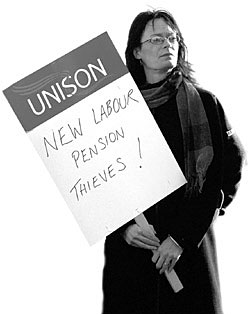The Grand Old Dukes of York
 In France weeks of protests, strikes, occupations and riots has forced the government to abandon the hugely controversial CPE labour law which would have allowed employers to fire workers under the age of 26 without reason in their first 2 years of employment. (Incidentally, the panoply of anti-CPE actions have apparently brought the country's riot police to the brink of exhaustion.) Nevertheless, actions continue (albeit with some drop off in participation) against the CNE which gives similar freedoms to small employers and in order to discourage the government from reintroducing similar laws in a new form.
In France weeks of protests, strikes, occupations and riots has forced the government to abandon the hugely controversial CPE labour law which would have allowed employers to fire workers under the age of 26 without reason in their first 2 years of employment. (Incidentally, the panoply of anti-CPE actions have apparently brought the country's riot police to the brink of exhaustion.) Nevertheless, actions continue (albeit with some drop off in participation) against the CNE which gives similar freedoms to small employers and in order to discourage the government from reintroducing similar laws in a new form.The parallel (chronologically if not tactically) struggle in the UK in defence of local government pensions has taken a rather more ambiguous turn. On Wednesday the various participating unions released a statement via the Trades Union Congress (TUC) announcing that a "joint statement" with the Local Government Association (LGA) would form the basis of further negotiations and that these talks were to be facilitated by the suspensions of plans for strike action. The statement suggests that the decision to call-off strikes was made "at a meeting of all the unions representing members covered by the Local Government Pension scheme" and planned action was not officially suspended until the relevant union bodies had a chance to meet, but there was never any real doubt that they'd do as they were told. The role of ordinary union members in the decision was so slight that my branch found out that strike action was off from the BBC.
As you might expect, the statement was welcomed by various union bureaucrats. Unison big cheese Dave Prentis averred, "The joint union/LGA statement is a positive step and that is why we have decided to suspend our planned strike action. It provides a framework to enable negotiations to take place on the future of the local government pension scheme and on protection arrangements." So after getting perhaps 1.5 million people what do we have to show for it apart from a framework for negotiations? To be fair to him, Prentis does concede there's lot of talking to be done, but I'm a tad dubious about exactly what constitutes a "satisfactory conclusion" in his eyes.
 Unison helpfully précis the joint statement, which "commits both sides to:"
Unison helpfully précis the joint statement, which "commits both sides to:"This strikes me as a particularly loaded kettle of fish. Note the implicit acceptance of the abolition of the "Rule of 85" (which allows workers to retire with a full pension at the age of 6o when the sum of their age and years of service exceeds 85), the only issue being exactly what protection will be available for those affected. Recall that the Rule of 85 was part of the contract to which LGPS members signed up. Imagine if the situation were reversed and I decided that I wasn't going to do my contractural hours anymore and instead was only going to turn up every other Thursday. One assumes my managers wouldn't be appeased by offers of negotiation about how the impact of my absence could be mitigated.
- discussing proper protection for current members of the LGPS pension scheme if the Rule of 85 were to be abolished
- making 50% of the savings available to pay for protections, and of savings from changes to the commutation arrangements
- agreeing that changes in future should be made by agreement where possible
- negotiating a fair new-look scheme for the future.
Note also that only protection for "current members" is up for discussion. This is essentially what civil servants and others on public sector pensions have "won," but I'm sure I'm not alone in wondering where exactly this leaves newcomers. Are they simply supposed to work until they die? (One assumes that death is considered an acceptable excuse for stopping work amongst all but the most extreme advocates of an increased age of retirment.) Lastly, but by no means leastly, what is one to make of the commitment to agree any future changes "where possible"? Is anybody so naive as to think that if the LGA decides to cut back the scheme again in a few years time (as they may well do given the prevailing climate) and fail to reach a consensus with the unions, that this glorified gentleman's agreement is going to stop them forcing their reforms through?
Furthermore it should be pointed out that the joint statement envisages discussions continuing until June. I don't want to stick my neck out and suggest that I can predict the outcome of these talks, although I'm not all that positive. Regardless of what we're presented with at the end of the day, the fact that any kind of action has been forestalled until June precludes the possibility of action to coincide with local elections which I continue to believe could have been one of our strongest weapons against an intransigent, but politically isolated Labour government. Too bad that once again it looks like the unions have bottled their chance to really challenge the government.
None of this is greatly surprising and I have never made much secret of my cynicism about modern trade unions. In the here and now you'll have to look long without success for an organisation similarly well suited to defending workers' interests, yet rather than taking the fight to the bosses, they are content to focus their energy on negotiations. By "representing" workers in this manner, they actually manage to disipate potential militancy and direct it towards less confrontational avenues. Hence they actually reinforce the status quo.
The French experience shows an alternative. While the unions did play an important part in the anti-CPE movement, they don't appear to have been its driving force. Instead this appears to have been driven by the spontaneous action of others, notably students, which forced the hands of the unionists. Obviously other forces were at play and nobody would deny that French unions are much more militant than their British counterparts and rather quicker to call a strike, nevertheless, the anti-CPE campaign seems to have been unusually militant and hetrogenous even for France. All of which is a rather long-winded way of pointing you towards this article (via) by Simon Tormey which does a compelling demolition job on the concept of representation and its utility in movement building. Tormey's is an argument which has some interesting implications, but they'll have to wait until my next post.
File Under: News, Pensions, Politics, Union, UK



















<< Home